In 1955 was formed the first Royal Australian Air Force jet aerobatic team Meteorites, flying on Gloster Meteor F8, which perform its first display in September 1955.
In 1961 were formed the Black Diamonds flying on 4 CA-27 Sabre aircraft. This team from 75th squadron exists untill 1964 when the 75th squadron begins to fly with Mirage 3. Some other aerobatic display teams existed in 1960's, like Black Panthers, Red Diamonds and Marksmen.
In 1962 to the Central Flying School of the Royal Air Forces of Australia based in East Sale (near
Melbourne) were established three aerobatic teams. One of them exists in the present days - the Roulettes. The two other teams were called respectively Red Sales and Telstars. Red Sales display team occurred in a crash during diamond barrel roll (More about Red Sales here). In 1970 was formed Deltas aerobatic team flying on six Mirage III at Williamtown, and did displays around Australia for the RAAF 50th Anniversary in 1971.
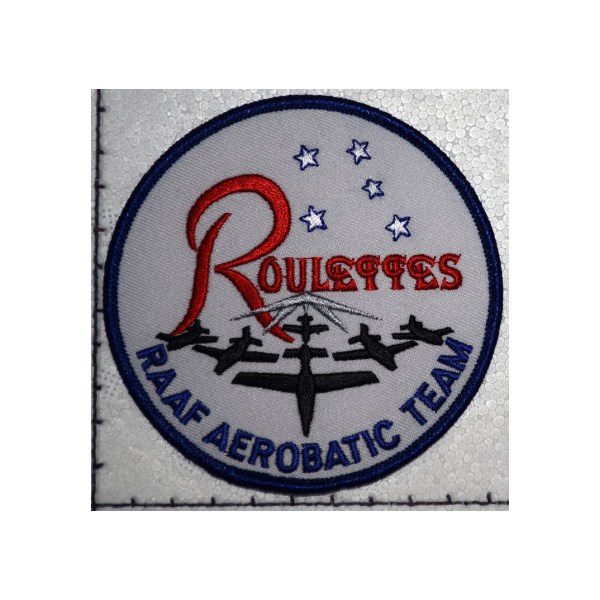
RAAF Roulettes Aerobatic Team
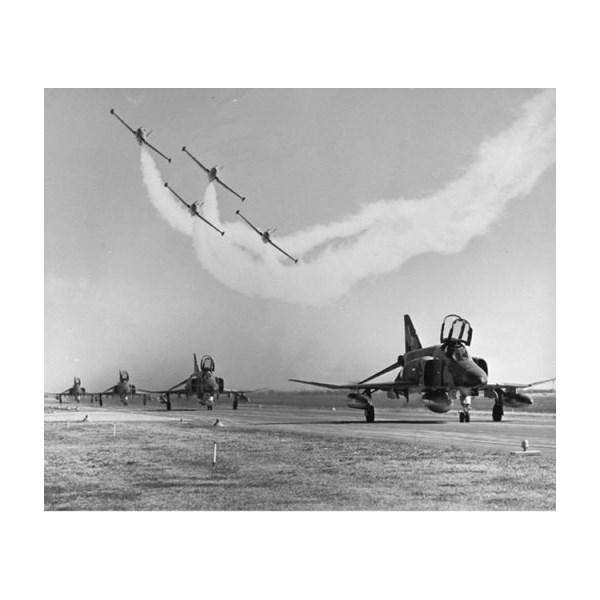
The Roulettes fly over 4 RAAF Phantoms
The Roulettes are the Royal Australian Air Force's formation aerobatic display team. They provide about 150 flying displays a year, in Australia and in friendly countries around the South-east Asian region. The Roulettes form part of the RAAF Central Flying School (CFS) at RAAF Base East Sale, Victoria.
The Central Flying School formed its first official aerobatic team in 1962, the Red Sales, using De Havilland Vampire jet fighters, but lapsed before reforming for a short time as the Telstars in 1962, then as the Telstars again for just two months in 1968, this time flying the Macchi MB-326 jet trainer.
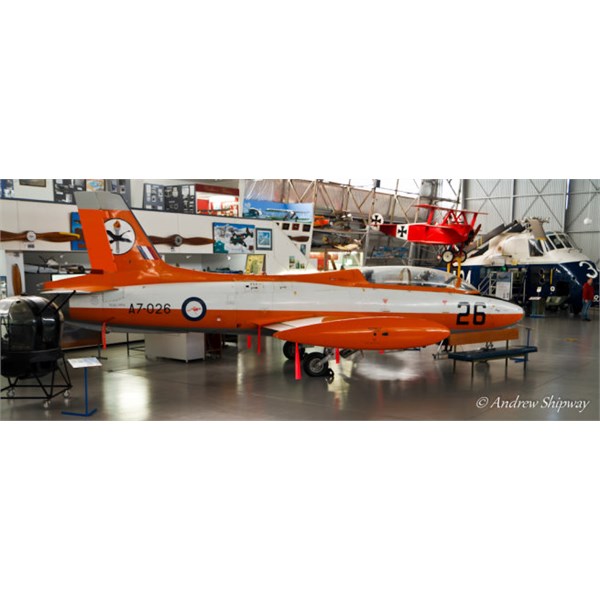
Aermacchi MB326H Delivered to the RAAF in 1968 and used by the Roulettes aerobatic team
Thursday 16 August 1962 was a black day for the RAAF when six pilots and four aircraft from The Red Sales aerobatic team were lost at RAAF East Sale, Vic. while training for Air Force week celebrations.
When Group Captain Peter Henderson (CO RAAF East Sale) returned from the UK in 1961 he marvelled at the RAF aerobatic teams. He conceived the notion that the RAAF should have a jet based aerobatic team using pilots from the Central Flying School, RAAF East Sale Vic.
The team would be known as The Red Sales using four De-Havilland T-33 Vampires. The red derived from the aircraft nose colour and sales from East Sale.
Training commenced under the command of Flt. Lt. Jim Rhind (RAF) and making their debut on 14 June 1962 as part of No 22 Navigator Course Graduation Ceremony at East Sale.
Through July & August the team flew four practice displays under the command of Flt. Lt. Reg Jones in preparation for their first public performance scheduled for 16th September 1962.
Unfortunately the Red Sales never made their public debut because they were all tragically lost on their fifth training flight.
The team were performing a low level barrel roll in diamond formation when they impacted the ground about 50m on the southside of Dutson Road with the leading three aircraft careering across the road and disintegrating in an adjoining property. The fourth aircraft crashed about 600m with the loss of all four aircraft & six occupants.
Newspaper reports of the day include descriptions of the planes crashing in a sheet of flame as
well as a passing
sedan having a swerve to miss the aircraft as they ploughed across the road.
At least one plane apparently tried to avoid the crash by breaking formation and attempting to gain height.
Killed were Flight Lieutenants Reg Jones (30), Alec
Young (30), Mike Dunbar (31), Peter Hearnden (28), Marty Burke (28) & Flying Officer Don Gow (27).
In October 1962 a court of inquiry found that the altitude of the leader was too low to commence the barrel roll. with the rest of the team basically "following the leader"
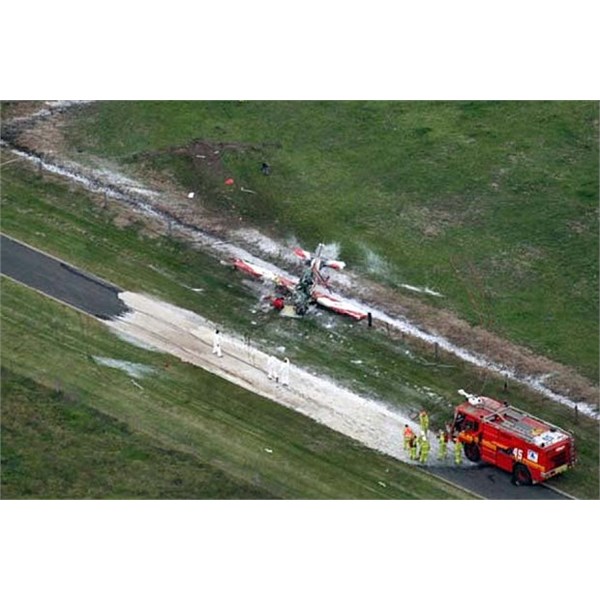
A plane used by the RAAF's Roulettes aerobatic team crashed at the East Sale airbase in Victoria
In 1970, the Roulettes were formed to celebrate the RAAF's 50th anniversary, and have been a permanent team ever since. Initially, they were equipped with four Macchis, growing to five aircraft in 1974 and seven in 1981 before cost-cutting saw the team reduced to five again in 1982. Towards the end of the 1980s, the Roulettes flying hours had to be reduced as the MB-326 fleet developed premature metal fatigue problems and a replacement aircraft type was investigated. In 1989, with the new Pilatus PC-9 trainers starting to arrive and MB-326 airframe hours severely limited, the Roulettes flew just a single pair of Macchis. The Roulettes switched over to the new PC-9s in late 1989, and arrived at the composition they have used ever since: six PC-9s plus a spare.
The aircraft are painted in the bold red, white and blue scheme, with a large "R" symbol on the tail. The RAAF has since adopted this scheme (minus the "R") for all its PC-9 trainers, except for the PC-9s at ARDU and FAC,[clarification needed] which allows an aircraft to be swapped into or out of the team to equalise fleet airframe hours by just repainting the tail.
There are seven Roulettes pilots at any given time, and gaining appointment to the team is a rare distinction. All are flying instructors, except number seven, who serves as the commentator and ferry pilot for the spare aircraft.
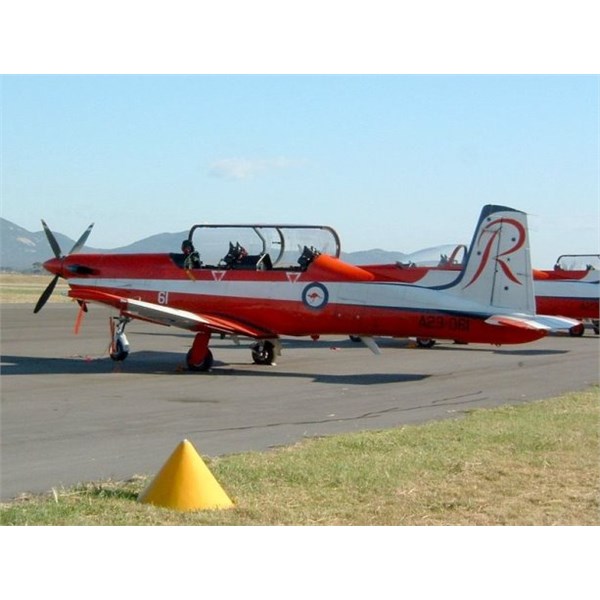
Pilatus PC-9A A23-061 of the Roulettes
From time to time, the CO of an RAAF operational squadron recommends a pilot for instructor duties with either the Basic Flying Training School at
Tamworth, NSW or at 2 Flying Training School at Pearce, WA. Upon progression through several levels of instructor categorisation, some of these pilots are then selected for duty at the Central Flying School, where they train flying instructors. From the 21 CFS senior instructors, the CFS commanding officer and the Roulette leader then offer selected individuals a chance to try out for the Roulettes. The team is organised in 'seasons' lasting six months; most members serve on the team for three seasons before moving on to other duties.
A pilot begins with three months of intensive formation aerobatic training, starting with relatively simple manoeuvres (such as loops and rolls in echelon or line astern) performed at altitude, and progressing through more complex and demanding ones (such as corkscrews, ripple rolls and rollbacks), close formation line abreast aerobatics (which requires constant fine attention to power and trim settings), and eventually working up to the full six-aircraft display routines. Only when a routine is
well-practised at altitude is it brought down in gradual steps to the minimum safe level of 500 feet (150 m). First season pilots fly as Roulettes 2, 3 or 4, while the more experienced pilots fly as Roulettes 5 and 6. Roulette 1 is the team leader, and Roulette 7 flies the spare aircraft, is responsible for public relations, and often provides commentary at flying displays.
The Roulettes always fly in formation, except on long transits to interstate airshows where they fly a very loose formation. In poor visibility, they close up to maintain visual contact, only executing a separation drill when visibility drops below two metres.
In 1975 the team demonstrates for a first time its abilities in a foreign country - during the celebrations of the Papua-New Guinnea's Independence Day.
The Roulettes have had four accidents over the years:
In 1983, two Macchis collided during practice near Sale and both pilots were killed;
In 1988, a mid-air collision saw Roulette 4 eject safely and Roulette 1 perform a gear-up landing; and
In 2005, another mid-air collision occurred during practice, with one pilot ejecting safely and the other landing his badly damaged aircraft safely.
In 2011, an engine failed in a PC-9/A during training at RAAF Base East Sale, resulting in the aircraft crashing. Both occupants were able to eject prior to impact.
.